


Cerro Gordo County Iowa
Part of the IaGenWeb Project
|
4 S. Federal Ave. Mason City IA
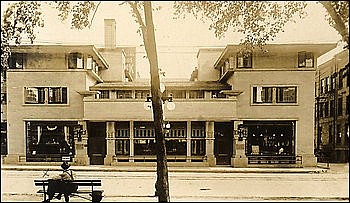 Park Inn Hotel and City National Bank are two adjacent commercial buildings which were designed in the Prairie School style by the renowned architect Frank Lloyd Wright. Completed in 1910 and originally containing 41 hotel rooms, the Park Inn Hotel is the last remaining Frank Lloyd Wright designed hotel in the world, of the six for which he was the architect of record. The City National Bank is one of only two remaining Frank Lloyd Wright designed banks in the world. It was the first Frank Lloyd Wright designed project in the state of Iowa, and today carries both major architectural and historical significance. The property was placed on the National Register of Historic Places September 14, 1972 and various attempts were made to restore it over the years. In 1999, the Park Inn Hotel was named on the Iowa Historic Preservation Alliance's Most Endangered Properties List. It was designated an official project of Save America's Treasures by the National Trust for Historic Preservation and went under a complete renovation. The Park Inn Hotel was the third hotel designed by Wright and served as the prototype for Midway Gardens in Chicago and the Imperial Hotel, Tokyo, which was torn down in 1962. Restoration of the Park Inn and City Bank were completed in September of 2011 at the cost of $18.5 million dollars that came from private and public funds. The property is owned by Wright on the Park, Inc., a non-profit organization that was formed in 2005.
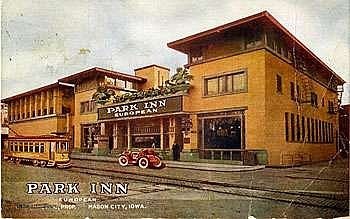
Des Moines Register
Re-opening of a Frank Lloyd Wright-designed hotel
Now, get ready to add another genuinely global attraction to our list – the old Park Inn Hotel and City National Bank buildings, both designed by Frank Lloyd WRIGHT, in downtown Mason City, the north Iowa hub city of 29,000. A restoration/renovation project that will exceed $15 million is well underway, being steered by a specially-formed local non-profit group, WRIGHT on the Park, Inc. "We have moved mountains to get to this point," said Ann MacGREGOR, 71, a community dynamo who was asked to ramrod the project as executive director of WRIGHT on the Park. "The buildings have been saved, thank God, with a whole lot of work by the city's grant writer Beth ENRIGHT. Now we absolutely have the corner turned." They have even set the date for the grand re-opening, September 10, 2010, which would be exactly 100 years since they first opened. From what I saw on a recent tour, I think the work could be completed pre-2010 if resources continue to flow. That is a big "if," of course. "Our major focus right now, in addition to clarifying our concept, our major focus is money," said MacGREGOR. You can help by going online to the site www.wrightonthepark.org and becoming a member of the new organization. For more than 30 years, actually ever since the buildings were placed on the National Register of Historic Places in 1972, the old hotel and former bank building have fueled both dreams and frustrations for dozens of would-be re-developers. All of them -- individual people, committees, businesses and organizations -- came at it with the best of intentions.
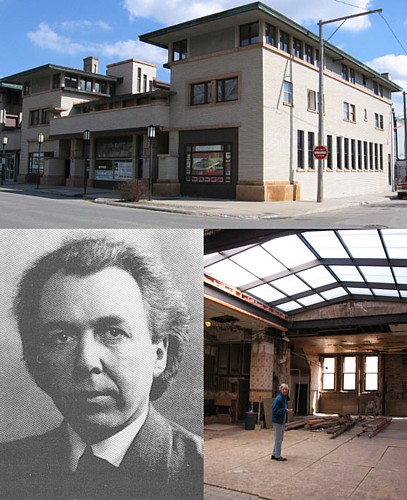
They all certainly recognized what an attraction that carefully-renovated, well-presented Frank Lloyd WRIGHT buildings would be. Especially the hotel, if it could offer guest rooms again, since it is the last WRIGHT-designed hotel standing in the world. WRIGHT, after all, is generally recognized as the greatest American architect, the man who made the "Prairie School" building style become coveted across the nation and around the world. And he was a master at using "Arts & Crafts" design in the furnishings and accents. How did he happen to do such extensive work in Mason City in the first decade of the last century? WRIGHT, a Wisconsin native whose early career was based in Chicago, had designed a boarding school in Spring Green, Wisconsin. Among its early students was the daughter of a senior partner in one of Mason City's leading law firms – BLYTHE, MARKLEY, RULE & SMITH. After they saw and admired WRIGHT'S work at the school, the law partners decided in 1908 to commission him to design their new offices in Mason City. What WRIGHT came up with for them was a then-unusual "commercial unit" positioned just across the street south from Central Park. The City National Bank was built on the east quarter-block, the hotel on the west quarter-block, with the law offices on a second floor between the connected buildings. While in town, he also designed "STOCKMAN House," which became the residence of the Dr. George STOCKMAN family. That started a parade of WRIGHT protégés into Mason City from 1910 to 1930, during which eight striking homes in the Prairie School style were designed above a creek in what is now called the Rock Glen/Rock Creek Historic District, just east of downtown. Most notable among those protégés was Walter Burley GRIFFIN, who gained his own fame with Prairie School design.
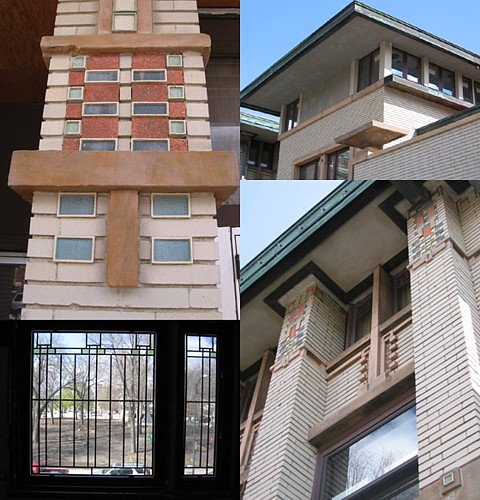
One measure of the enduring popularity of Wright, who died in 1959, is that nearly a half-century later, the Frank Lloyd WRIGHT Foundation and Society are still signing up new admirers, researchers and wannabes. The Prairie School homes in the Rock Glen/Rock Creek neighborhood of Mason City have always been prized, and have been in great shape as long as I can remember. The New York Times, in a story in the year 2000, called it "one of the nation's finest collections of Prairie School architecture in an achingly picturesque, if slightly too arboreal, setting." But WRIGHT'S innovative "commercial unit" downtown was troubled almost from the beginning. "When the City National Bank was built and opened in 1910, it was one of five downtown banks," said MacGREGOR. "Within a few years, there was one left," most of them victims of recessions and then the Great Depression of the 1930's. Today the former bank building houses Moorman Clothiers on the ground floor, and a CPA firm had its offices upstairs until recently. "The Park Inn Hotel did very well when it first opened – it was new and elegant – but actually its 40 rooms were pretty small, about 10-by-10-feet, with shared bathrooms," she continued. "In about 1918, the Hanford Hotel opened two blocks to the north, 'with private baths and all the amenities for the modern traveler,' as they advertised. The Park Inn was toast." The hotel deteriorated badly through the decades, with some alteration of the original WRIGHT interior design. Some of the guest rooms were converted to apartments. Various businesses had offices there briefly, a couple of cafes have operated in it, and the Mason City Chamber of Commerce occupied the west ground floor for years. Eventually the upper two floors were deserted. By the early 1990's, it seemed destined for the wrecking ball. That's when Dr. Bob McCOY, a physician who lives in one of the Prairie School homes and had turned himself into a first-rate architectural historian, and MacGREGOR'S late husband Dr. John MacGREGOR "led the charge to save it," Ann said. They convinced the City of Mason City to take ownership, and eventually it was handed off to the Mason City Foundation, which was headed then by a former mayor, Carl MILLER. The foundation took the lead for five years on stabilizing the hotel, but by then the foundation had its hands full with its own "Music Man Square" project, a great tribute to Mason City's most famous native son, composer Meredith WILLSON. At one point in the late 1990's, Heartland Properties, a division of Alliant Energy, proposed rehabbing the hotel to become subsidized housing units, but that was turned down in hopes that some entity could redevelop a working hotel there. Meanwhile, said Ann MacGREGOR, the grant writing of ENRIGHT and the fundraising by many others allowed the foundation to completely clean the building, get a new roof on it, clean and tuck-point the exterior, and more. In 2005, the foundation gave the hotel back to the city, and Mayor Jean MARINOS, who was serving then, asked Mason Citians to step up if they wanted to be involved in trying to complete the redevelopment of the historic structure. Here came MacGREGOR. In the late 1960's, she arrived in Mason City, a nurse who had married everybody's favorite local doc. In the 1970's she was raising their kids. In the 1980's, she helped found, organize and build Hospice of North Iowa, which she ran for the next two decades, with end-of-life care for people across the region. In 1995, she and John MacGREGOR took time to ride their bicycles across the U.S. with us OFFENBURGERS and 300 other Iowans, promoting the state's upcoming Sesquicentennial celebration. In the first three years of the new century, Ann worked as chairperson of Mason City's own Sesquicentennial celebration. After John's death in the summer of 2003, she worked part-time in a downtown business as she reorganized her own life. And a year ago, her community called on her again – this time to head-up this project with global reach. "Is it a little scary, at this stage in my life? Sure it is," MacGREGOR said. "But, what a privilege to be asked to do this!" She rounded up McCOY and a dozen other allies around the city, and formed WRIGHT on the Park, Inc. They started their work by touring four "boutique historic hotels" that have been renovated and are operating in the Midwest – the Hotel Winneshiek in Decorah, the Hotel Pattee in Perry, the Blackhawk Hotel in Cedar Falls and the St. James Hotel in Red Wing, Minnesota. They contracted with two richly-experienced hotel consultants – Howard KALER, who also is general manager of the Hotel Pattee in Perry, and Craig SCOTT, of Red Wing.
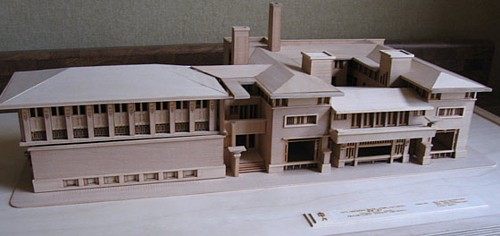
Plans are to have 20 guest rooms in the hotel itself, and yes, each will have its own bathroom. The lobby will be restored to its original appearance, with a mezzanine hanging above the front desk. A story-and-a-half atrium behind the front desk will have a 20-by-20-foot stained glass ceiling, just as it originally did. What I always have thought was one of the hotel's neatest features – a "Ladies Parlor" on the front second floor with a balcony overlooking Central Park – will indeed be included in the new design. "I've got my own room picked out," MacGREGOR said. "It's third floor west, looking out over the park and then I'll have the Ladies Parlor balcony nearby for morning coffee." We OFFENBURGERS, and a lot of other people, will look forward to joining her on that balcony for that morning coffee. Transcription by Sharon R. Becker, October of 2011; updated November of 2013
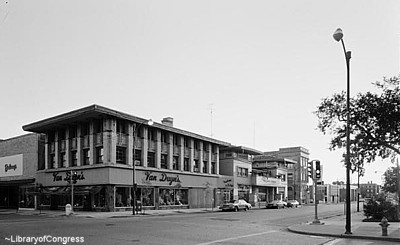
|
Return to Cerro Gordo's National Register of Historic Places Index Page Return to History Index Page Return to Cerro Gordo Home Page